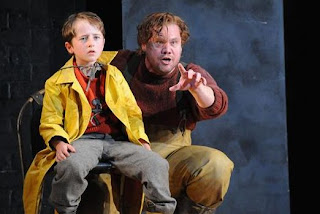 A better Grimes would be hard to find
A better Grimes would be hard to findReviewed by Peter McCallum
AT THE heart of Britten's Peter Grimes lies a metaphor for the human condition that in part explains its status as one of the enduring modernist operas.
Huddled on a ragged coast, a borough bickers about small pleasures while fed and lashed by a hostile sea. The individual who stands aloof is spiritually ostracised by the community, and defeated by the sea to which he eventually surrenders.
There seemed no reason for Opera Australia to replace its previous production of this work when so many other operas cry out for performances, but Neil Armfield's new production is a triumph for its dramatic focus and superb performances from Stuart Skelton and Susan Gritton.
Singing Grimes, Skelton achieves immaculate control and precision without losing the roughness of character. His voice flashes with power yet achieves a mystical serenity in the sustained high notes of the great aria The Great Bear and the Pleiades with which Grimes interrupts the venal pleasures of the locals in the storm-swept pub.
Skelton shambles, smiles, loses control, flashes with anger and becomes possessed by the vision that destroys him in a performance that could scarcely be bettered. Gritton as Ellen Orford matches this with singing of rich yet deeply human power that achieves transfixing strength while never losing its warmth. Peter Coleman-Wright completes the central trio as a flinty powerful Balstrode whose attempts to mediate eventually admit defeat.
Ralph Myers's set is an authentic re-creation of a community hall that evoked the claustrophobia of small-community pettiness admirably, while the side doors opened evocatively to town and sea. This made the opening chorus seem disbursed, but its sound later, at the front of the stage and in lynching mood, was terrifying.
The conductor, Mark Wigglesworth, matched the care of Armfield's dramatic timing with precision, though in moments like the first Sea Interlude the orchestral sound from the pit lacked intimacy.
Andrew Moran had venal energy as Ned Keene, and Catherine Carby as Auntie, the publican, and her nieces, Lorina Gore and Taryn Fiebig, brought radiant sounds to the trio of Act II.
David Corcoran (the hypocritical Methodist), Richard Anderson (the pompous lawyer), Elizabeth Campbell (the widow addicted to laudanum and crime), Kanen Breen (the rector) and Jud Arthur (the carter), filled out a strong cast of small-minded citizens. Nicholas Bakopoulos-Cooke was as ill-fed a waif as ever graced a Dickensian stage, while Peter Carroll as the poet George Crabbe, drinking, laughing and dancing, watched them fall.


